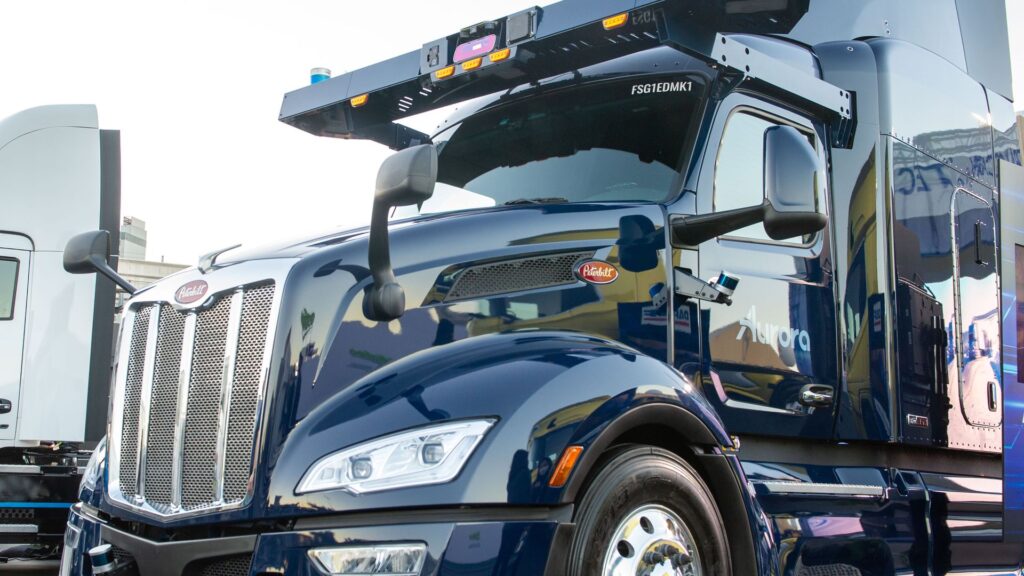Following years of trial runs and setbacks, Aurora Innovation says its first fully-autonomous semitruck has hit public highways in the Lonestar State and has already completed 1,200 miles of travel. Dubbed the company’s Class 8 line of trucks, the self-driving semi is making deliveries between Dallas and Houston, according to a statement from Aurora.
Who were the first customers?
The company revealed its first customers for these new trips are Uber Freight and Hirsbach Motor lines, which reportedly “delivers time-and-temperature-sensitive freight.” The companies completed test drives with Aurora, which included safety drivers to track the autonomous technology called “Aurora Driver.” Aurora says its new commercial trucks will no longer have safety drivers aboard.
Unbiased. Straight Facts.TM
Aurora Innovation’s fully autonomous semitrucks have debuted on Texas highways between Houston and Dallas.

Aurora Innovation CEO’s statement
Aurora CEO Chris Urmson says he tagged along in the backseat of the truck’s maiden drive. He called the experience an “honor of a lifetime.”
Ursmon said in the statement, “We founded Aurora to deliver the benefits of self-driving technology, quickly and broadly. Now, we are the first company to successfully and safely operate a commercial driverless trucking service on public roads.”
What kind of technology was used?
The trucks feature sensors that can reportedly track the length of four football fields as well as a high-tech computer system. Aurora says it’s currently operating a single autonomous truck for deliveries but plans to add more later this year.
A new solution to overlapping problems
Aurora reportedly believes its new technology is a potential solution to address a current shortage of truckers and high turnover rates within the industry as well as the rising costs of operation. The company claims its new vehicles could reduce labor costs while also improving safety on highways.
Testing
The company touts its four years of supervised testing, which took place mostly in Texas, as it delivered more than 10,000 loads to customers across roughly 3 million miles with its autonomous technology. Aurora also says its vehicles showed they are capable of predicting red-light runners and can detect pedestrians from considerable distances. The company also points out its partnerships with trucking industry innovators like Continental, Volvo, Uber and others.
Moving forward amid setbacks, regulations
The move comes amid setbacks to driverless truck implementation on the open road. They were once thought to be introduced before robotaxis and autonomous private vehicles in mass rollouts. The idea was that autonomous trucks would be easier to implement given the open nature of highways, as opposed to more intricate city and residential areas.
The industry has faced obstacles in terms of technology setbacks and regulations, which have delayed the truck’s public introduction. Some firms, such as Embark Trucks, TuSimple and Locomotion have shuttered completely, while other companies have scrapped efforts to deploy self-driving semis as investors pulled back.
Aurora Innovation had anticipated rolling out its new autonomous trucks last year, but delayed the deployment to this year, saying that the firm needed to update its self-driving system for “surface-street driving and construction sites.”
Self-driving semis have also faced obstacles from regulations, but these barriers may be easing up. California regulators are currently looking into a proposal allowing self-driving large pickup trucks of just over 10,000 pounds to be tested on public roads.
Public skepticism
The public is skeptical of self-driving vehicles, and companies like Tesla and Cruise have faced questions regarding safety in the wake of some high-profile accidents. Cruise faced criticism and legal trouble after its robotaxi hit and injured a woman in San Francisco in October 2023. The woman got pinned under the vehicle and was dragged 20 feet, according to authorities.
New proposals
The California Department of Motor Vehicles says self-driving trucks the size of a Dodge Ram or Ford Super Duty pickup are already being tested in states like Texas, Arizona and Arkansas. The Golden State, however, is the only state with a ban on self-driving heavy-duty trucks. The proposed rules have now entered a public comment period which commences in June.
The new proposal will likely face opposition from safety advocates and labor unions for commercial truck drivers, who are worried about job losses due to semi automation in the near future. They have also reportedly raised safety concerns over the new technology in general.
California lawmakers passed legislation in 2023 requiring people to ride along in self-driving semis, but the bill was vetoed by Gov. Gavin Newsom, D-Calif. Newsom argued that more regulation wasn’t needed because existing rules for self-driving vehicles were already adequate. The Teamsters Union supported the bill.
California currently outlaws any self-driving vehicle weighing more than 10,000 pounds on public roads.
Companies like Aurora often use states like Texas and California for testing new technology. California-based autonomous trucking company Gatik currently completes “short-haul deliveries” for major retailers such as Walmart.


